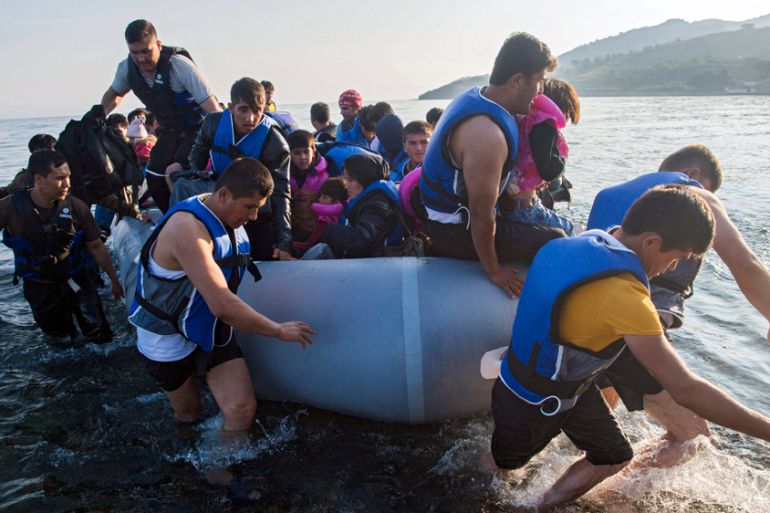Sea survivors’ stories: Landing on Lesbos
Al Jazeera spoke to refugees in Greece after the perilous Aegean Sea crossing about war and a brighter future in Europe.

Lesbos, Greece – With tens of thousands of people arriving by boat on the shores of Lesbos, the Greek island remains at the forefront of Europe’s refugee crisis.
The Aegean Sea crossing for those fleeing war and persecution is short – but it can be deadly. About 450,000 people have arrived by sea in Greece this year, and more than 100 have died attempting the crossing from Turkey, according to the UN’s refugee agency.
Keep reading
list of 4 itemsBeyond borders: Migrants online
Tunis police raid sees refugees abandoned near the border with Algeria
‘No turning back’: Carnation Revolution divides Portugal again, 50 years on
The plastic dinghies that smugglers use are typically crammed well over capacity. Falling overboard and drowning has become a weekly occurrence.
Al Jazeera spoke to survivors of the horrors of war about their lives and hopes for the future as they stepped off boats and set foot on European soil for the first time.
| Nasratullah Nabizada, drug rehabilitation counsellor, Afghanistan |
![Nasratullah Nabizada [Kelly Lynn/Al Jazeera]](/wp-content/uploads/2015/10/364d6cb7660f4b41945183db99ee25d5_18.jpeg)
Nasratullah Nabizada was a counsellor at a hospital in Helmand province, Afghanistan, before he fled to Europe – a profession he hopes to continue in Sweden.
“The situation in Helmand province is so bad, I couldn’t continue living there,” Nabizada said.
“I really like Sweden, so that’s where I am heading. I can’t speak Swedish yet, but I want to learn the language and will. Hopefully, I will manage to get a job doing the same work at a hospital there that I did in Afghanistan.”
| Abdullah Karakeesh, anaesthesiologist, Syria |
![Abdullah Karakeesh [Marta Malaspina/Al Jazeera]](/wp-content/uploads/2015/10/96bfa0789c9b42d4853bd83a46b28cff_18.jpeg)
Abdullah Karakeesh, from Idlib in Syria, received a university degree in anaesthesiology earlier this year.
The dingy he took across the Aegean Sea started flooding halfway during the midnight crossing. A 10-month-old baby on the same boat died of pneumonia after being dropped overboard in the chaos and panic.
“They piled 63 people into our boat. The boat was only meant to take 35,” Karakeesh said, recalling the sea crossing.
“We tried to tell them we wouldn’t go on it, but then the smugglers brought out guns and threatened to shoot us.
“Three kilometres into the journey and the boat started sinking, the baby died, [and] we couldn’t do anything. I just thank God that I am still alive.”
| Eman Aazawi, hairdresser, Iraq |
![Eman Aazawi [Kelly Lynn/Al Jazeera]](/wp-content/uploads/2015/10/d9c5c9ee9f284d979898db81d02074f0_18.jpeg)
Eman Aazawi was a hairdresser in Iraq’s capital Baghdad before fleeing the Islamic State of Iraq and the Levant (ISIL) group’s violence in the city and surrounding area. An avid animal lover her whole life, Aazawi couldn’t bear to leave the two family dogs – Rose and Milo – so they also took the perilous journey over the Aegean with her.
“There is no peace there; people die there every day,” Aazawi told Al Jazeera of her homeland, just minutes after setting foot on Lesbos.
“Rose is Milo’s mother, so we had to bring them together.”
| Anonymous, humanitarian volunteer, Syria |
![Anonymous [Kelly Lynn/Al Jazeera]](/wp-content/uploads/2015/10/112d1334b737489db126c48f8fd0670d_18.jpeg)
The volunteer came over on a plastic dinghy at the end of September, but after seeing the situation on Lesbos – and being able to speak fluent English – he decided to stay on the island and help other refugees.
“There are two types of people in the world. There are talking people, who just talk and do nothing, and there are people who care about reality,” he told Al Jazeera.
“The world is not good – OK, do something about it. If there is a place that needs help, then go help.”
He asked for anonymity to protect family members still in Syria.
| Awso family, Syria |
![The Awso Family [Kelly Lynn/Al Jazeera]](/wp-content/uploads/2015/10/4cc918fc818846a98875f1f92019f77c_18.jpeg)
Abed Awso was a tailor in Hasakeh city in Syria, but earlier this year, he decided his family had to leave because of violence. His daughters found the journey terrifying, but now that the whole family has landed in Europe, Awso has started looking forward to a new life in Germany, their final destination.
“It just isn’t safe there,” Awso said of his hometown. “My children’s future was lost there.”
“For me, Europe is a place where we will feel safe,” said Eva, Awso’s wife, placing her hands on the shoulders of her two young daughters, Aleen and Rojee.
“That’s the most important thing.”
| Zajal Ali, pharmaceutical industry, Iraq |
![Zajal Ali [Kelly Lynn/Al Jazeera]](/wp-content/uploads/2015/10/8b8af8038a614b2c8c5a5e75d1d39726_18.jpeg)
Zajal Ali was a successful businesswoman working for a chain of pharmacies in Baghdad. However, she knew she had to leave Iraq when ISIL fighters threatened to kill her 14-year-old son, Omar.
Now, Ali said, she just wants to live a comfortable life in Finland – her preferred destination – away from fear for herself and her family.
“We just want to be safe, to live safe lives and be comfortable. If we had stayed in Baghdad, we would have eventually been killed, I’m sure. Now I just thank God because, being in Europe, I believe we have escaped from death.”
| Anonymous, salon worker, Syria |
![Anonymous [Kelly Lynn/Al Jazeera]](/wp-content/uploads/2015/10/866e9a188395434b99f2d1c5e3b28c40_18.jpeg)
“The sea scared me so much,” the Syrian woman told Al Jazeera. “It was my first time ever on the sea.”
She is from ISIL-controlled Deir az Zor, and decided to flee to Europe after her parents were killed.
“I don’t have anyone there any more,” she said.
Still shivering after being soaked during the 7km crossing, the 34-year-old said she was anxious but looking forward to the future.
“I’m nervous, but when I’m settled in Germany, I will get married there. I have a fiance who is still in Turkey. He will make the crossing soon when we have enough money,” she said, asking to remain anonymous.